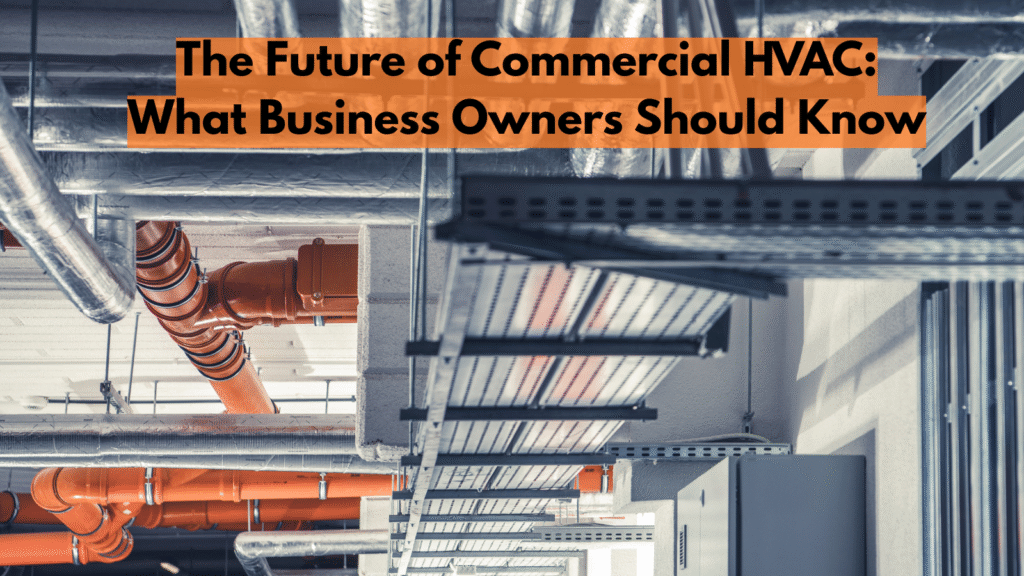As technology advances and energy efficiency becomes a greater priority, the commercial HVAC industry is evolving to meet new demands. Business owners looking to optimize costs, improve indoor air quality, and reduce their environmental footprint must stay ahead of these innovations. Here’s what you need to know about the future of commercial HVAC and how it can impact your business.
Smart HVAC Systems & Automation
Modern commercial HVAC systems are increasingly integrated with smart building technology. These systems use sensors, automation, and artificial intelligence (AI) to monitor and adjust temperature, humidity, and air quality in real time. Benefits include:
- Increased efficiency by only using energy when and where it’s needed.
- Lower operational costs through automated adjustments based on occupancy.
- Remote access via mobile apps or cloud-based platforms.
The Shift to Energy-Efficient and Sustainable HVAC
With rising energy costs and stricter environmental regulations, businesses are moving toward energy-efficient HVAC solutions. Key advancements include:
- Variable Refrigerant Flow (VRF) Systems: These allow precise temperature control in different zones, reducing waste.
- Geothermal Heating & Cooling: Utilizes underground energy for a sustainable heating and cooling source.
- ENERGY STAR-Certified Equipment: Designed to maximize energy efficiency and lower utility costs.
Advanced Air Purification & Filtration
Indoor air quality (IAQ) is a growing concern for businesses, particularly in office buildings, healthcare facilities, and retail spaces. New filtration technologies are emerging to improve IAQ:
- UV Light Air Purifiers: Reduce airborne pathogens, mold, and bacteria.
- HEPA & MERV 13+ Filters: Capture more fine particles and allergens.
- Bipolar Ionization: Neutralizes airborne contaminants and reduces odors.
Refrigerant Innovations & Regulatory Changes
The HVAC industry is transitioning to eco-friendly refrigerants due to regulations phasing out traditional options like R-22 and R-410A. Businesses will soon see:
- Low-GWP (Global Warming Potential) Refrigerants: New options such as R-32 and R-454B are more environmentally friendly.
- Higher Efficiency Cooling Systems: Future commercial HVAC systems will require fewer emissions while maintaining performance.
Demand for Electrification & Decarbonization
As governments push for reduced carbon emissions, electrification of HVAC systems is becoming a trend. More businesses are opting for:
- Electric Heat Pumps: Providing both heating and cooling with lower energy consumption.
- Hybrid HVAC Systems: Combining traditional furnaces with electric options to reduce overall fuel use.
- Renewable Energy Integration: Some systems now pair with solar panels for added efficiency.
Predictive Maintenance & AI-Driven Diagnostics
Instead of waiting for HVAC failures, businesses can now use predictive maintenance powered by AI. These systems:
- Analyze system data to detect early signs of malfunction.
- Provide automated alerts for required maintenance before costly breakdowns occur.
- Reduce downtime and extend the life of HVAC equipment.
Custom HVAC Solutions for Industry-Specific Needs
Different industries require specialized HVAC solutions. The future of commercial HVAC will focus on:
- Retail & Hospitality: Zoned climate control for customer comfort.
- Healthcare Facilities: Enhanced filtration to prevent airborne infections.
- Data Centers: Precise cooling to protect sensitive equipment.
- Manufacturing & Warehouses: Large-scale ventilation for safety compliance.
Future-Proof Your Business with an HVAC Upgrade
Staying ahead of these HVAC advancements can improve your business’s efficiency, air quality, and cost savings. If you’re considering upgrading your commercial HVAC system, Marsh Heating & Air Conditioning is here to help. With over 50 years of experience serving Minnesota businesses, we provide the latest technology and energy-efficient solutions tailored to your needs.

